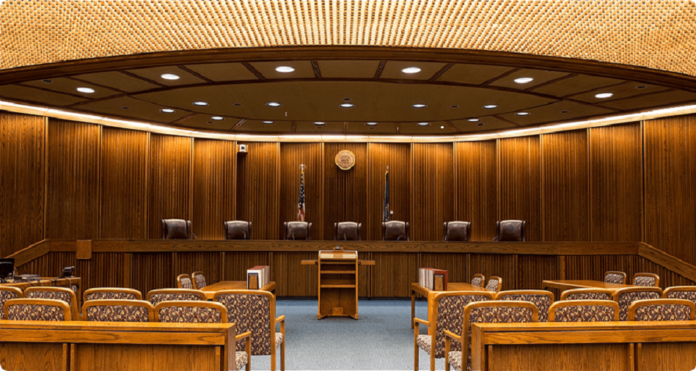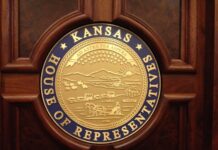A new legal dispute emerged before the Kansas Supreme Court on Tuesday over whether a bill in the Legislature would resolve a legal challenge to a state law making it illegal to impersonate an election official.
Justice Caleb Stegall asked attorneys for the state and the plaintiffs how the court should respond to a bill in the Legislature that’s intended to fix any deficiencies in a law making it a felony for someone to knowingly given the impression they’re an election official.
The lawyer for the state, Brad Schlozman, said the bill would render the case moot and effectively end the litigation. Elisabeth Frost, the lawyer for the four civic groups challenging the law, said the new proposal was still unconstitutionally vague.
The bill had already passed out of a committee last week was expected to be taken up by the full chamber on Tuesday, but wasn’t after the House failed to override the governor’s tax plan.
“The court might consider that there could be mooting legislation in relatively short order,” Schlozman told Stegall.
The current law requires groups to “knowingly” give the appearance of misrepresenting an election official to be at risk of prosecution.
The new bill says that falsely misrepresenting an election official means engaging in conduct with the intent to cause someone to believe they’re acting as an election official.
The new bill, Schlozman said, is intended to address subtle conduct where someone could be viewed as an election official.
“There could be situations where you’re not specifically trying to represent yourself as an election official, but you’re engaging in conduct that you sort of know is going to cause that person to believe” you’re an election official, he said.
Frost disputed Schlozman’s claim that passage of the bill would moot the case.
“The new legislation is proposed. It’s obviously not law. We don’t know if it ever will become law. We don’t know what it will say if it does,” Frost said.
Frost said the language in the bill is still sufficiently vague to leave doubt about what conduct would still be allowed without giving the impression that someone was illegally acting as an election official.
Frost pointed to a hearing on the bill where a couple of the plaintiffs testified that they didn’t know what conduct would be permissible.
Lawmakers, however, said they believed that “intent” should be sufficient for defining what constitutes illegal conduct.
“It won’t be moot,” Frost said. “That doesn’t save someone from the fear and the chill, which itself is a constitutional infirmity.”
Earlier during oral arguments, Schlozman was pressed to answer questions about how the existing law could send civic activists to jail for circulating truthful information.
Justice Dan Biles, who originally recused himself from the case, said someone would have to be arrested, booked and bonded out of jail before a judge or jury could determine whether their conduct portrayed them as an election official.
“That has a tremendous chilling effect on this speech, right,” Biles asked. “It’s a lot of trouble to go to find out whether what you did was correct.”
Biles asked Schlozman if the statute criminalized the dissemination of truthful information.
“If this person who looks like an election official…is just handing out pamphlets from the election office – perfectly accurate information – they can go to jail,” Biles said.
Schlozman disagreed.
“I do not think that simply handing out election material is the kind of conduct that’s intended to be addressed by statute,” he said.
Biles told Schlozman that explanation didn’t make sense.
“I think the way the statute can be construed is to knowingly engage in conduct that causes a person to think you’re an election official,” Schlozman said.
The state has always argued that the law required the groups to “knowingly” give the appearance of misrepresenting an election official to be at risk of prosecution for registering and educating voters across Kansas.
Two lower courts agreed with that interpretation, finding the plaintiffs in the case didn’t have standing to bring a lawsuit because they hadn’t violated the law.
The Kansas Court of Appeals said that the plain language of the law had been misunderstood because it prohibits “knowing” conduct.
Mere confusion that someone would be perceived as an election official does not subject them to criminal prosecution, the court said.
However, the Supreme Court reversed that ruling, saying that the Kansas Court of Appeals erred when it ruled that the plaintiffs didn’t have standing to challenge the law in court.
The case heard by the Kansas Supreme Court on Tuesday has been combined with a separate case challenging laws that cap the number of ballots third parties can collect and deliver to election offices on behalf of someone else.
It also is part of the same case contesting a ban on county election officers from accepting an advance voting ballot sent by mail unless they verify the signature on an advance voting ballot envelope matches the one on file in the voter registration records.
















